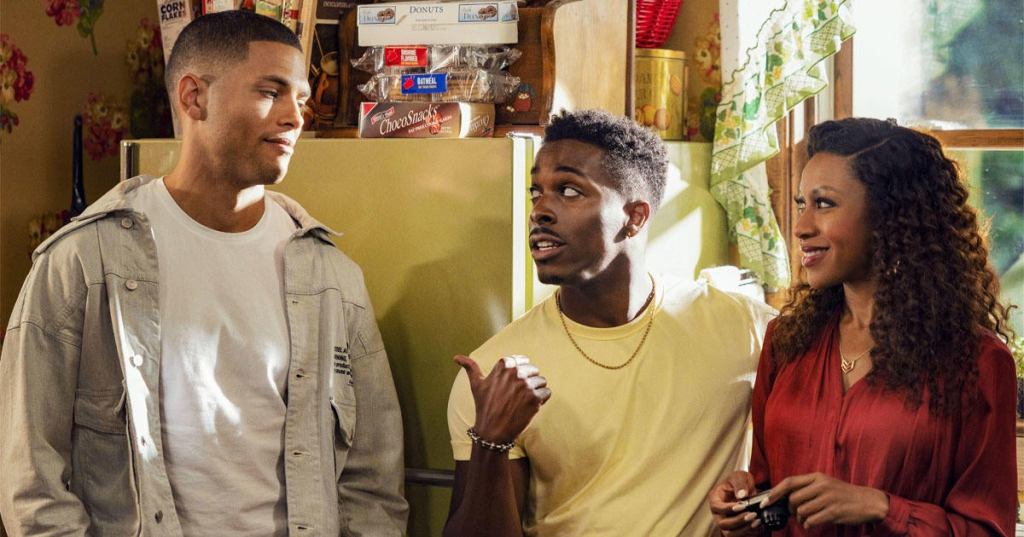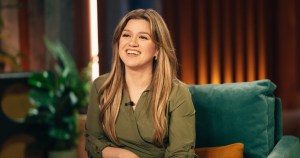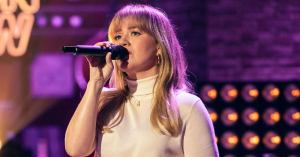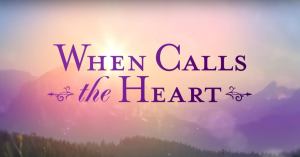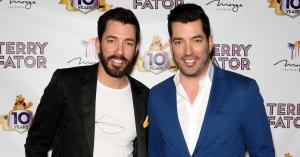Tyler Perry is back in his famous Mabel “Madea” Simmons character and fans cannot be more excited. His latest Netflix film A Madea Homecoming marks his 12th time as the beloved family matriarch in one of his dozens of films. It also marks the return of Madea after Perry previously said he’d no longer portray her. This time around, Madea is gathering with family to celebrate the college graduation of her great-grandson Tim, played by Brandon Black. But as any Perry production would have it, chaos ensues as family secrets are exposed and threaten to jeopardize Tim’s celebratory weekend.
The role is a dream of Black’s. The actor has long wished to work with the multifaceted Perry. He grew up alongside his mother and grandmother watching Perry’s stage plays and movies, with his grandmother championing for him to one day star in one of Perry’s projects.
Videos by PopCulture.com
Black is not only fulfilling a dream, but he’s also making history while doing so. In A Madea Homecoming, Black is playing the first openly gay character in the history of Madea movies. It’s not something that Black takes likely. PopCulture.com spoke with Black about the significance of the role, his grandmother’s manifestation of him working with Perry coming to fruition, takeaways from the film and more. The film will be available on the streaming service beginning Feb. 25.
PC: I watched the movie, A Madea Homecoming, and I thoroughly enjoyed it. I’m a huge Tyler Perry and Madea fan, and it was really good to see you in this film. So was it a dream of yours to be part of a Tyler Perry production?
BB: Ooh, let me not cry while saying this. My grandmother has always wanted me to be in a Tyler Perry project. Probably like most gay – or not gay – probably like most Black actors, I should say, not gay, like their grandparents would say, “You know who you should call is that Tyler Perry.” That’s what my grandma would always say. And it was just exhausting to hear. Because I can’t just pick up the phone and call Tyler Perry, grandma. And then all of a sudden I booked this movie and I have one on one scenes with Tyler Perry.
And there was this moment before he called action, I look over and there’s a record in Madea’s house – because they did a very good job of dressing it like a grandma’s house – it’s got the little candies and the little dish, all that, you know the little butterscotch and the strawberries? So I look over and it’s “Love and Happiness.” It’s got the album. And I was like, “That was my grandma’s song.” And for that to have caught my eye right before he called action, I was just like, “Man, I’m in the right spot right now.” And I felt really [good]. So in that way, yes, it’s always been a dream. I’m trying not to [cry]. You’re going to get me. In that way, it’s always been a dream because I do this for me, my mom and my grandma. And so I was like – I checked one off the list.
So your grandmother manifested that.
Sure did. And she passed away before she got to see me do it, like less than a year later. So it sucks that she’s not here to see it, but also I feel like perhaps wherever-
It was all her doing.
Yeah. I’m like maybe that’s what needed to [happen], like she organized the situation.
She organized it from the heavens. That is so amazing. And obviously, like you mentioned, you grew up on Tyler Perry and we love the Tyler Perry stage plays and this movie is based on the last stage play that featured Madea, A Madea Farewell. Did you watch the play before auditioning or in order to prepare you for filming this project?
That’s an excellent question. I had no idea that there was a play before this. Obviously, I knew that there were plays. I knew the plays before the movies, but I didn’t know that there was one for this movie. And I did the audition, when I did the audition, it wasn’t a Madea movie. It was an untitled Tyler Perry project.
So there was no way for me to try to pull from anything. And then when I booked it was like, “Hey, you need to be in Atlanta in three days.” So again, I was just like grabbing stuff and taking my dog to San Diego and flying to Atlanta. There wasn’t much time to kind of try to pull from some of his past stuff. I found out when I got there from one of the producers that this was a play. And I was like, “Oh well I hope I can do it justice.” I didn’t know that I was stepping into the shoes that someone else had played. So I don’t know. We’ll see what happens. We’ll see what everybody thinks when it comes out. I hope I did all right.
Well, the play, there are some differences [from the movie]. Tyler Perry’s known for either merging a few plays or kind of differentiating it up from stage play to television or to film. And he definitely does that in this movie. There’s been a lot of talk around you starring as the first openly gay character in a Madea film. And there have been characters who identify as LGBTQ+ in Perry’s productions, whether that’s in the series or sometimes in plays, but never in the film. So how significant do you think that is for the Tyler Perry brand? For the time that we live in? And especially because his core audience, as we know is Black. And historically, whether Black people have had family support, in our communities coming out has been seen as like a big deal or taboo or we want to protect our loved ones. So what does this moment mean for you and mean for where we are headed forward?
Tim is well spoken, opinionated, tough and is going off to become the next Barack Obama, and he’s gay. So the whole thing that we have in the Black community about, “They try to emasculate our men” or whatever. Tim is standing up to his entire family to say something that’s difficult for him to say and is going to go be literally the next Barack Obama. I want people to take from this movie that being gay is not less than, it doesn’t make you less of a man. It doesn’t, none of that. And that’s something that I keep hearing in our community a lot and it makes it difficult for people to come out because they don’t feel like they’re going to get the same support.
So seeing that everybody in this family supports Tim and gives Tim all their love, I think with this audience being very, very Black, right? We’ve got a huge Black audience and now we have the whole world with it being on Netflix. I think that this is the right time to add in that element and help push people’s imagination of what the Black man is. Because I think straight or not, this idea of what a Black man has to be is crippling to all of us, straight, gay, anything, you need to be yourself. And that’s what a Black man is. He is someone standing up in themselves, not having to fit a vibe, a narrative.
And you spoke on it briefly when I spoke about whether it a dream of yours to work with Tyler Perry, but how was it working with Perry and the rest of the cast? I spoke to Cassi Davis a while back about her being such a staple within the Tyler Perry brand and community. And I’m like, “I can imagine there are nonstop laughs on set and that you have to kind of reel it back in order to stay in character.” But I’m sure it is so difficult.
I got to say, I feel like I have one of the hardest jobs, because my character’s going through a lot of stuff and it’s not funny to him, but some of the stuff said back to Tim, when he’s trying to have this moment, was making me break character so many times. I was trying so hard not to laugh because Cassi Davis is brilliant. So funny.
And her and Tyler Perry, their chemistry, and the way that they feed off of each other is ridiculous.
And you know who that is in your family, you know those two women, you know them.
The two aunties. Yes.
The two aunties. Right? So it was really great getting to work with all of them. They are such pros and they know the Tyler Perry pace and the world that he works in so well. I helped me to kind of be able to pull Miss Cassi Davis to the side and be like, “What advice can you give me?” And she was like, “Know your lines and have fun.” Yes, people say that. But it really depends on who’s telling you, and at what time you’re hearing it as to then how you’re going to receive it and know your lines at that moment was. It hit me different because it was like, we’re moving too fast for you to be playing around, not knowing your words, and have fun. [Have fun] means, this is what you wanted to do. I’m a pretty serious [actor]. Everything’s so important. And it was kind of nice because when she took the Aunt Bam vibe off and she was just Cassi, I was like, “Oh, you’re acting, got it. You’re having a good time. Got it, I need to do that.”
And there are so many hard-hitting things woven into this film. Tyler Perry is infamous for using comedy [to tell difficult stories]. Laughter’s good for the soul and in our community, we always say, “You have to laugh to keep from crying.” And he does such a good job of that. And in this film, you hit on the Black Lives Matter Movement, there’s a lot of talk about cultural differences with your best friend’s character, and family dysfunction. And you spoke about wanting the coming out aspect in the LGBTQ+ community and the inclusion of that into this film – you want viewers to take something away from that. But what other themes do you want viewers to really gather from this movie?
One of the other things that I loved about this movie was that we didn’t all agree. My Aunt Ellie, she’s a cop and Tim wanting to go and be a public defender, we are not seeing eye to eye on this, but what I loved about the movie is that there’s kind of somebody for everybody in the movie. And they all still come together as a family. There’s some drama with my dad, which, I’m glad that’s in there too, because dads are interesting. Dads can be a lot like they were in that movie. My dad is played by Amani Atkinson, who killed it.
So I guess aside from acceptance and being yourself being the main things I want you to take away from Tim, I want people to also see that Black people are not a monolith. And I know we say it all the time, but in this movie you have every different perspective here. And these are all people that really exist in Black families.
[In real life] I have a Republican uncle. I have an uncle that reminds me so much of Uncle Joe, so much, the leather, all of it, the walking with a cane, a toothpick in their mouth, the whole situation. So I want people to see we’re all different. We’re not all the same. And I think this being on Netflix, going to the world and also with Brendan O’Carroll being in the movie, making this something that people in the UK are definitely going to watch, they’re going to see more of who we are in total, not just the one person that you keep seeing in the movie.
And what other projects are you working on that you’re excited about outside of A Madea Homecoming, which I cannot wait for the audience to see. What else are we going to get from Brandon Black this year?
Man, there is something else coming. I’m not allowed to say what it is yet because it’s also going to be on Netflix, I’ll say that. And it’s a different tone than A Madea Homecoming, very polar opposite. And it was cool because I booked that right after I got back from shooting Madea. So it was this whiplash of like, we’re laughing and then we are not laughing over here. So I can’t say what it is just yet, but if y’all follow me at @BBlack. I will definitely be posting about it when I’m allowed to.

